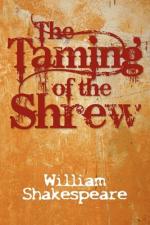|
This section contains 8,845 words (approx. 30 pages at 300 words per page) |

|
SOURCE: Maurer, Margaret. “Constering Bianca: The Taming of the Shrew and The Woman's Prize, or The Tamer Tamed.” In Medieval and Renaissance Drama in England, edited by John Pitcher, pp. 186-206. Madison, N.J.: Fairleigh Dickinson University Press, 2001.
In the following essay, Maurer explores emendations in Shakespeare's play that substantially alter the characterization of Bianca, resulting in a less complex character than the playwright originally intended.
Ovidius Naso was the man. And why indeed “Naso,” but for smelling out the odoriferous flowers of fancy, the jerks of invention? Imitari is nothing: so doth the hound his master, the ape his keeper, the tired horse his rider.
—Love's Labor's Lost, 4.2.123-27
The early seventeenth-century sequel to Shakespeare's Taming of the Shrew is the return, not of the shrew, but of her little sister Bianca. In The Woman's Prize, or The Tamer Tamed, it is Byancha who instigates Petruchio's new...
|
This section contains 8,845 words (approx. 30 pages at 300 words per page) |

|


